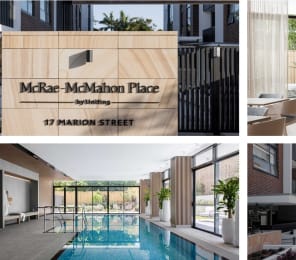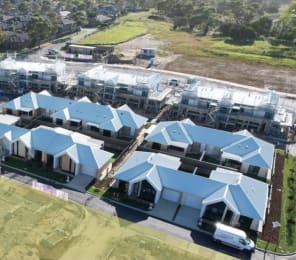Linda Mellors is responsible for Regis Aged Care’s 8,000 residents (and their 8,000 families), plus 9,000 staff and their families), and the Mums, Dads and super funds that have invested in the operator.
“I think if you look at the experience everywhere, if your frontline workers go down, you’ve got nothing. It breaks my heart to hear what happened in Spain and the States,” she said. “You need to make your frontline workers feel safe and well supported so they can do what they’re passionate about which is looking after their residents and clients.”
“The other thing – which is something everyone is doing in spades – is being really open with residents and families about what you’re doing and why,” she said, adding: “Speed is far more important than perfection when you have lots of decisions that need to be made really fast.”
Linda’s advice to other operators?
Focus on the frontline workers – and keep the communication channels flowing.
Linda joined Regis – one of Australia’s largest aged care providers – as CEO designate in August 2019 before commencing her full role as Chief Executive Officer and Managing Director in September 2019 – just eight months ago.
With 65 aged care homes, six retirement villages, six home care services and five day therapy centres, under her leadership, her responsibilities are considerable.
In addition to 8,000 residents, the operator has 9,000 staff to which it owes a duty of care to keep both physically and financially safe, as well as suppliers that rely on Regis to pay their bills and a Government that is funding Regis to provide ‘safe and quality’ care for residents.
Finally, Regis has its shareholders who invested on the guarantee of a return.
A research scientist by training, Linda does have experience in leading large organisations. Previously, she was the Chief Executive Health Services and Chief Operating Officer of a large not for profit where she led acute, sub-acute, residential aged care, home care, retirement living, mental health and palliative care services.
This healthcare background has been key in preparing Regis to face the testing time created by COVID-19.
“I knew what we needed to do from a major crisis point of view,” she said. “In hospitals, you are always confronting or preparing for different infections, outbreaks and crises.”
This is a new challenge however – one that comes without the support of State Government health funding and no shareholders. Hospitals also have the benefit of a dedicated, professionally trained staff who are culturally committed to be there – such as doctors, RNs and allied health – plus the backing of the public.
Unlike aged care, people are also there to get well – and leave the system.
Like all sector leaders, Linda now has to ‘hold the ship together’ for the next six months – and more. So what steps is she taking to ensure this happens?
Demonstrating wise leadership, the CEO had made the decision at the end of 2019 to appoint two new senior clinical roles – an Executive General Manager Clinical and Care Practice and a National Manager Infection Control – prior to the crisis.
While these staff members only started in their roles last month, both have deep knowledge of infection prevention and control.
“It has coincided perfectly to have those resources,” Linda said. “They are just brilliant.”
The CEO says Regis has been developing its COVID-19 business continuity plans since February and they are now prepared as much as they can be – but this has required considerable time and money.
“There’s been a really strong focus on getting really well prepared and making sure we are all galvanised around supporting the frontline workforce,” she said.
Their executive and senior team has been meeting daily, initially in person and then remotely, every day for the past six weeks including over weekends – critical as all eyes, including shareholders, are on the organisation.
“No one has even blinked,” she said. “They are all just getting on with what needs to be done seven days a week.”
They have also modelled a number of scenarios and distributed a range of resources to all of their homes, with PPE being stored in regional hubs.
“One of the benefits of being one of the biggest providers is we could do a lot of work without burdening our frontline teams which has left them to focus on their residents, clients, families and staff without having to worry.”
Similar to other providers, Regis implemented its ‘stringent access controls’ (Linda uses this term over ‘lockdown’) limiting visitors to end-of-life and compassionate visits at 5pm on 17 March – before the Government issued its directive for homes to restrict visitors.
These controls have received a positive response from families and the residents themselves.
“People can forget easily that elderly residents still have very strong opinions and a lifetime of experience and they have had a really balanced response to the situation,” she said. “They understand some things just have to be done and they will be lifted when they can.”
Regis has the results to back this up. They recently surveyed the residents in both its homes and villages to gauge their response to the controls with staff and families to be surveyed this week.
Of the residents in their homes that responded, 90% believed the stringent access controls were the right decision, while 94% felt safe and well supported since the limited visitation was introduced.
In their retirement villages, the rates were 96% and 95% respectively.
Conscious too of the need to support families, Regis has rolled out iPads and Surface Go tablets to all of their homes to help residents maintain contact with family and friends.
“Staff have been working themselves inside out to find other means of communication,” Linda said.
Aware that 40% of aged care residents don’t get visitors, the operator has also asked their volunteers – who cannot visit the homes – to keep in contact with those residents without support from family and friends.
Like many operators, Linda says Regis is now playing a waiting game and monitoring constantly to see if residents, clients or staff develop symptoms.
The operator has maintained occupancy and is still taking on new residents – subject to careful screening.
Whether these numbers take a dip in coming months as families hold off placing older loved ones into residential care – and the impact this has on RADs – and whether the Government will ask operators to take on patients discharged from hospitals to ease the pressure on the health care system – remains to be seen.
“It’s all just waiting to see what’s happening with community transmission,” she said.
“As soon as it is safe to do so, we will relax the stringent access controls. No one wants to have this level of controls in place so we will just keep monitoring it.”










